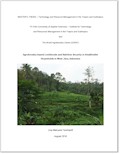| Thesis |
 |
|
| Title | Agroforestry-based Livelihoods and Nutrition Security in Smallholder Households in West Java, Indonesia | | Author | Lina Manuela Tennhardt | | Year | 2016 | | Academic Departement, University | TH Koln (University of Applied Sciences) | | City | Koln, Germany | | Number of Pages | 109 | | Departement | Technology and Resource Management in the Tropics and Subtropics | | Degree | Master | | Call Number | TD0184-16 | | Keywords | Payment for ecosystem services, agroforestry, land-use profitability, food and nutrition security |
|
| Abstract: |
| Payment for Ecosystem Services (PES) schemes are established economic instruments that promote environmental conservation while also improving peoples’ livelihoods. Both are crucial in developing countries, where environmental degradation poses a threat and smallholder farmers often face poverty, food- and nutrition insecurity. Hence, PES schemes are considered suitable to reduce poverty, with varying success and impact. This research focusses on the influence of a PES scheme on farming profitability as well as food and nutrition security in smallholder households with agroforestry systems in Cidanau watershed, Banten, Indonesia. Results indicate that the PES has not increased farmers’ profitability and received payments represent a minimal share of farmers’ incomes from agriculture. Nonetheless, depending on the tree-crop composition, agroforestry systems can be economically viable in comparison to rice mono-cropping. Across all farming systems, there is a big potential to increase productivity and consequent profitability. At the same time, food and nutrition security in Cidanau is moderate, yet comparable across farming systems and independent of PES participation. Considering all sampled households however, significant positive correlations were identified for food expenditures and (i) dietary diversity as well as (ii) food security in the access dimension. This indicates that food- and nutrition security in Cidanau is influenced by households’ purchase power. The extreme market-orientation and -dependency of smallholders leaves them vulnerable to market failures and fluctuating prices. Policies must help to increase smallholders’ productivity and facilitate their market-integration for higher incomes, while at the same time strengthen food self-sufficiency of smallholders. |
|